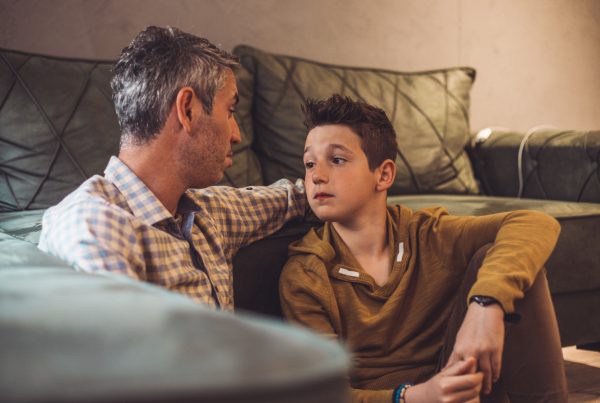High-functioning anxiety in teens often manifests as excessive worry, perfectionism, and overachievement. They may be successful and driven but struggle with constant nervousness, restlessness, and self-doubt. Physical symptoms like headaches, muscle tension, and sleep disturbances are common. Despite their outward achievements, these teens may secretly battle intense fear of failure and social anxiety.
Seeing your teen constantly stressed and striving for perfection can be worrisome, especially when they seem to never relax.
On one hand, seeing a teen show passion and engagement would make any parent proud – but when their success is hiding dangerous trends such as overworking, self-doubt, and even self-harm, then it’s important to peek behind the curtain and figure out what’s going on.
This article explores the most common symptoms of high-functioning anxiety among teens.
Understanding High-Functioning Anxiety
Stress is not inherently a bad thing, but anxiety usually is.
Being overly anxious means stressing excessively, and usually over the small things. Too much stress can eat away at us, affecting our health, mood, and quality of life.
Not all levels of anxiety result in an anxiety disorder. Mental health disorders are usually characterized by a lack of functioning or some form of impairment. However, some teens function just fine while experiencing anxiety. While they might not need a diagnosis, they still need help.
You can function while anxious, but that won’t detract from the negative effects of long-term anxiety – especially on anxious teens, who are still in the middle of physical and mental development and might burn out before even reaching adulthood.
Symptoms of High-Functioning Anxiety Among Teens
Teens with high-functioning anxiety might be very outgoing, even aggressive, and seemingly get everything done the way they want.
But underneath the veneer of a Type A personality hides a neurotic and stressed mind. At first glance, high-functioning anxiety among teens can be hard to spot and easy to miss – but a closer look tells us more.
Here’s a closer look at some of the common symptoms of high-functioning anxiety among teens:
Emotional Symptoms
The emotional symptoms of high-functioning anxiety are the same as any other form of anxiety.
Teens with high-functioning anxiety experience persistent fears or worries, often to an excessive degree. They also feel tense most of the time, restless, and unable to relax.
Teens with high-functioning anxiety might realize that they’re worrying too much, but that often becomes another thing to worry about.
Cognitive Symptoms
Despite their high-functioning, teens with anxiety do struggle cognitively.
They overthink about the future, set themselves too many “what-if” scenarios, excessively plan or think about future outcomes, and strive for perfection to the degree that they scrap perfectly good work or don’t allow themselves to finish personal projects.
Behavioral Symptoms
As a result of their high-functioning anxiety, many teens experience episodes of procrastination due to being worried about imperfection, followed by an intense work crunch.
They are more likely to say yes to everyone and no to no one, leading to fully packed schedules.
They saw approval and reassurances from everyone.
Physical Symptoms
Anxiety can have a direct impact on a teen’s health, most clearly seen in a lack of sleep.
Restlessness and insomnia are common in teens with high-functioning anxiety, resulting in physical and mental fatigue.
They might also be easily startled and more likely to get sick (and less likely to call in a sick day).
Impact on Daily Life
On the outside, high-functioning anxiety allows teens to set and meet nearly any goal they choose. They’re driven – and it shows.
But they’re often driven by fear. Fear of failure, fear of not meeting expectations, fear of falling short, fear of being found out (imposter syndrome), and fear of not being enough. Teens experiencing high-functioning anxiety might be one big mistake or one bad day away from experiencing a panic attack or a mental breakdown.
Socially, teens with high-functioning anxiety have a hard time turning down an invitation, even if they don’t really want to be there. They’re afraid of driving people away, of saying no, and are much more likely to be people-pleasers to their own detriment. They tend to have full schedules all the time.
Privately, teens who struggle with high-functioning anxiety often pick up a number of quirks as potential coping mechanisms for their anxiety, including nervous chatter, nervous habits (lip biting, knuckle cracking), procrastination and crunch work, repetitive behavior (rocking, repeating phrases, counting objects), an overloaded schedule, a need for validation and affirmation, physical fatigue, restlessness, and a much higher potential for substance abuse.
Coping Strategies and Support
Recognizing a high-functioning, anxious teen isn’t hard once you know what to look for. If you see your loved one or best friend struggle underneath the surface, consider reaching out to help.
It’s not always easy for someone with high-functioning anxiety to agree that they need help. While they might agree that they’re anxious, they might fear losing their drive if they start addressing their fears.
In other cases, they might not want to recognize that their thought processes are driven by anxiety or that trying to get help for their sources of “motivation” is an overreaction.
Despite their achievements, teens who struggle with high-functioning anxiety are ultimately struggling with anxiety.
It can shorten their lives, put them at greater risk of maladaptive coping, and worsen their relationships. Getting help can change that.
Teen Anxiety Treatment
Are you concerned about your teen’s constant worry and stress despite their apparent success?
Imagine a future where they can achieve their goals and, most importantly, be happy without the burden of anxiety holding them back.
At Visions Treatment Centers, our expert team specializes in helping teens address anxiety through individualized, compassionate, and effective treatment programs—contact us today to learn more about teen anxiety and our treatment modalities.
Conclusion
High-functioning anxiety in teens often manifests as excessive worry, perfectionism, and overachievement.
Despite their outward successes and driven nature, they may struggle with constant nervousness, restlessness, and self-doubt, accompanied by physical symptoms like headaches, muscle tension, and sleep disturbances.
Teens with high-functioning anxiety might not seem to need help, but they’re more likely to struggle with the downsides of their neurotic side in the long term.








